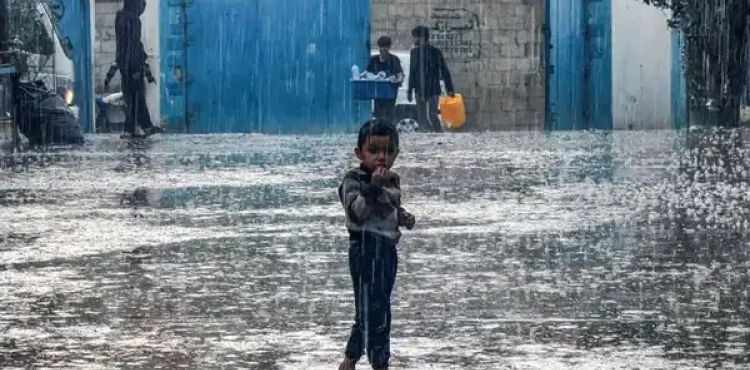A depression accompanied by a cold air mass hit the Gaza Strip, which in turn caused rain to fall and exacerbated the suffering of hundreds of thousands of residents of the Strip, who were forced to leave their homes and move to tents and schools run by UNRWA, in light of the ongoing Israeli blockade that prevents the entry of basic materials into the Strip.
Partly cloudy weather, cool tending to very cold, accompanied by thunderstorms and strong winds prevails in the north of the country and the rest of the Palestinian territories, according to the Director General of the Palestinian Meteorological Department, Yousef Abu Asaad.
The suffering of the residents of the Gaza Strip displaced towards the south has become more difficult as a result of their direct exposure to frosty weather without the availability of heavy clothing to protect them from the cold.
Hisham Muhanna, spokesman for the International Committee of the Red Cross in Gaza, appealed to international organizations and countries to provide heavy winter clothes for children and adults alike, especially since the displaced people left their homes more than 40 days ago before the harsh winter season began.
Muhanna stressed that winter clothing is not the only thing that residents of the southern Gaza Strip lack, noting that they also suffer from:
A shortage of winter blankets, and the difficulty of providing them in light of the current conditions that the Gaza Strip is suffering from, especially since there is no place to buy these clothes, no new goods entering Gaza, and no shops opening their doors.
The potentially catastrophic effects of rain on refugee camps and shelter centers are catastrophic, and there are fears that they will be flooded with water, which will make them an unfit place to stay in, which in turn worsens the conditions of the displaced.
Muhanna warned of the possibility of torrential rains and floods in low-lying areas and valleys, as well as high wind speeds, which would worsen the conditions of the displaced.












